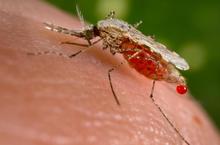As many people are welcoming the early summer months, warmer temperatures, increased humidity and showers are bringing a rising population of mosquitoes to most areas. Mosquitoes transmit West Nile virus to humans and horses after contracting the disease from infected birds, according to the Centers for Disease Control and Prevention.

Disease threat from mosquito bite
As with humans, most horses infected with the virus do not show symptoms or become sick, but according to the U.S. Department of Agriculture, in a third of horse-related cases with critical symptoms, the horses die.
In 2013, 29 human cases were reported in Missouri and 117 in Illinois. Fourteen cases were reported among Missouri horses and 16 horses in Illinois. Illinois is the seventh-highest state for reported cases, according to the agency.
For humans there is no vaccination nor are there any medications to treat the virus, according to the CDC. Most people infected with the virus will show no symptoms. One in five infected people will develop a fever and other symptoms, but less than 1 percent will develop a serious neurological illness such as encephalitis, myelitis or meningitis, according to the CDC.
While there is no vaccination to protect humans from West Nile virus, there is a vaccination to prevent it in horses.
The Missouri Division of Animal Health recommends horse owners consult their veterinarians for the best vaccine, but also advises people to keep their horses indoors during dawn and dusk and to rid nearby areas of any standing water.
As with humans, most horses infected with the virus do not show symptoms or become sick, but according to the U.S. Department of Agriculture, in a third of horse-related cases with critical symptoms, the horses die.
Horses that do become sick will often lose coordination and appetite, suffer confusion, fever, stiffness and muscle weakness, particularly in their hindquarters.
Jane Wernsman, executive director at the County Health Department, said there aren't visible signs of an infected mosquito bite like there are with tick bites and Lyme disease.
The key for West Nile virus prevention in humans is preparing yourself, Landers said.
"Anywhere mosquitoes are present, the possibility of being infected with the virus is there," she said.
Standing, stagnant water is a breeding ground for mosquitoes, and the best way to avoid the virus is to prevent bites.
The CDC recommends the following actions to prevent the virus from spreading:
- When outdoors, use repellents containing DEET, picaridin, IR3535, some oil of lemon eucalyptus or para-menthane-diol.
- Many mosquitoes are most active from dusk to dawn. Be sure to use insect repellent and wear long sleeves and pants at these times or consider staying indoors.
- Make sure you have good screens on your windows and doors to keep mosquitoes out.
- Get rid of mosquito breeding sites by emptying standing water from flower pots, buckets and barrels. Change the water in pet dishes and replace the water in bird baths weekly. Drill holes in tire swings so water drains out. Keep children's wading pools empty and on their sides when they aren't being used.
